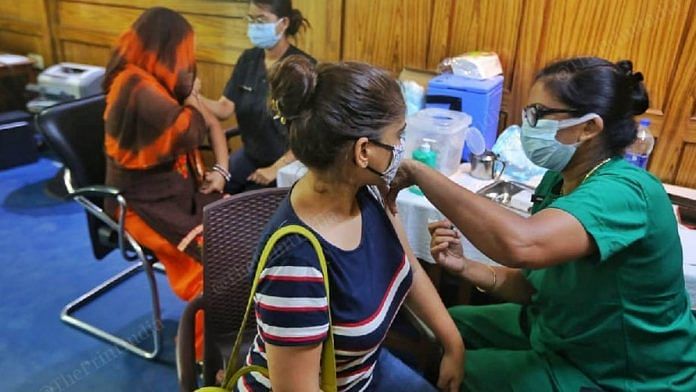New Delhi: Over 86 lakh doses of Covid-19 vaccines were administered across India on 21 June, the first day of a new regime of vaccine procurement under which the central government started pooled procurement and supply to states.
Less than a week later, the number plummeted to just 17 lakh Sunday. Through the week, the numbers remained in the 50-60 lakh range, without once touching the Monday “record”.
While ministers and experts associated with some of the government committees have claimed that India is eyeing a daily vaccination target of 1 crore per day, senior officials in the Ministry of Health and Family Welfare expect the numbers to remain in the less-than-75-lakh-per-day bracket for some time to come.
States have already been told that 12 crore vaccines will be available for the month of July. This means a daily average of even 50 lakh may not be achievable in the coming month.
Asked why daily vaccination numbers are swinging so widely, a senior health ministry official said on condition of anonymity: “Things are stabilising now. It may be more to do with the fact that supplies are increasing now and states getting more supplies with time. And also yesterday was a Sunday.”
Vaccination numbers have a tendency of plummeting not just on weekends but also on local festivals and holidays both because of a lack of vaccinators as well as beneficiaries, officials said.
India’s total vaccine availability in June too has been about 12 crore doses, of which 10.76 crore had been administered until Sunday. This means about 1.23 crore vaccines are still available with states to be administered over the next three days — an average of no more than 40 lakh per day even if every single available dose is used.
Also read: Delaying 2nd AstraZeneca vaccine shot by upto 45 weeks improves immune response: Oxford study
Supplies will be the limiting factor for some time to come
In an affidavit dated 26 June, the Narendra Modi government told the Supreme Court that a total of 135 crore doses of vaccines would be available between August and December.
This means the per-month average comes to about 27 crore and the best possible daily vaccination numbers to about 90 lakh per day — still short of the 1-crore target. That is if zero doses are wasted. In reality, around 10-30 per cent vaccines could be wasted, if past experience is anything to go by.
In the same affidavit, the Centre said: “…the total population of the country aged 18 years and above is approximately 93-94 crore. As such, administering two doses to these beneficiaries would require an estimated 186 to 188 crore vaccine doses. As shown in the table above, out of this requirement, 51.6 crore doses will be made available for administration by 31.07.2021 leaving a requirement of approximately 135 crore vaccine doses for complete vaccination to the eligible population.”
It added: “The above figure of 186 crore includes the aforesaid figure of 135 crores [break-up of which is given hereunder] for which necessary arrangements have been made. It is submitted that this figure of 186.6 crore does not include other vaccines which are at various stages of development as on date within the country and may come and become available.”
The Centre therefore expects all adults in the country to be vaccinated by the end of the year with two doses of the vaccine.
The government is also optimistic about the availability of the Covid vaccine for children. It told the top court that while Bharat Biotech is currently carrying out enrolment to conduct clinical trials on healthy volunteers between 2 and 18 years of age, Zydus Cadila, which is developing DNA vaccines, has concluded its clinical trial for the 12-18 age group and “subject to the statutory permissions, the same may be available in near future”.
Also read: Global spread of Delta variant shows ‘no one is safe until everyone is safe’ from Covid



